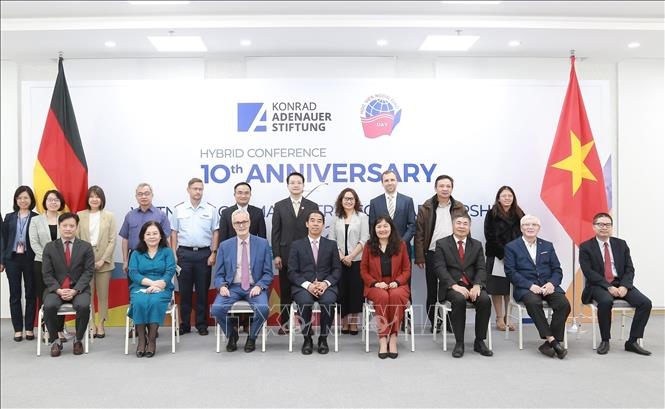Ample room remains to develop bilateral ties with Germany
The Diplomatic Academy of Vietnam (DAV) under the Ministry of Foreign Affairs has collaborated with the Konrad Adenauer Foundation (KAS) of Germany to organize a seminar to celebrate the 10th anniversary of the Vietnam - Germany Strategic Partnership (2011-2021).

The seminar serves as a forum for both sides to review the numerous milestones achieved in over the past decade, whilst also identifying opportunities and challenges moving forward in a bid to further deepen the strategic partnership. This will serve to make policy recommendations on bilateral co-operation and practical contributions to the implementation of the Strategic Action Plan for the 2022 to 2023 period.
As part of his speech at the event, Deputy Foreign Minister To Anh Dung affirmed that the establishing of the Vietnam-Germany Strategic Partnership on October 11, 2011, was a historic milestone, thereby opening a new chapter in the relationship between the two countries.
After a decade of implementation, both nations have made great strides across multiple fields, while there remains plenty of room for both nations to carry forward bilateral relations, the local diplomat noted.
Political relations continue to be consolidated through delegation exchanges at all levels, along with high-level contacts at multilateral forums. Indeed, the two sides have closely co-ordinated and successfully promoted the upgrading of ASEAN-EU relations to a partnership.
Economic co-operation has also become a leading pillar as the Central European nation represents the leading Vietnamese trading partner in the EU, while the Vietnamese market has also risen to become Germany's largest trading partner in Southeast Asia.
Other important fields include such as education-training, culture-society, and development co-operation, with three key focuses on renewable energy, environmental protection, and vocational training, all of which have so far reaped tremendous achievements.
During the COVID-19 pandemic, Germany's donation of nearly 3.5 million doses of vaccines and an array of other medical equipment and supplies to the nation is a testament to the growing friendship between the two countries.
According to Martin Thummel, deputy head of the Department of East Asia, Southeast Asia and the Pacific region under the German Foreign Office, affirmed that the strategic partnership between over the past decade has been effectively implemented on both bilateral and multilateral levels.
In the context of a global strategy and many major changes after 10 years, both nations continue to share common interests of respecting international law, whilst also a keenness to maintain a rules-based order, along with ensuring global peace and security.
For Germany, the country represents one of its most important partners in ASEAN. As a result of this, strengthening ties with Vietnam is an important part of German policy towards the Indo-Pacific region, a strategy which is deployed on three pillars, namely prosperity, sustainability, and security.
Concerning joint political-security co-operation, participants said that the advantage of the bilateral relationship is the increasing political trust and the convergence of policies at a strategic level.
Most notably, the two sides have agreed on many regional and international issues, whilst also successfully establishing many co-operation mechanisms in the fields of economics, politics, science and technology, security-defence, and development co-operation.
German Ambassador to Vietnam Guido Hildner stated that the relationship between the two countries therefore boats huge potential for stronger development. Indeed, both sides need to continue to increase their strategic dialogue and the frequency of delegation exchanges at all levels so as to create a solid foundation for future ties.
With regard to multilateral co-operation, the two sides must continue to serve as a bridge connecting the EU to the ASEAN region, while working closely at the UN and Asian-Europe Meeting (ASEM) to promote priorities on dealing with climate change and building a rule-based order internationally.
One of the key talking points at the event focused on socio-economic co-operation between the two countries. Vietnamese Ambassador to Germany Nguyen Minh Vu affirmed that the economy represents a key and important field for both nations' development. This comes after the total bilateral trade turnover and total investment value between the two countries has grown rapidly in numerous areas where they have advantages over recent years.
Last year saw the nation surpass Singapore and Malaysia to become Germany's largest trading partner in Southeast Asia, with bilateral turnover reaching US$15 billion, along with the increasing shift of investment capital and high-quality human resources.
This can be viewed as the result of the effective application of two-way tariff removal efforts, especially the ratification of the EU-Vietnam Free Trade Agreement (EVFTA) and the establishment of the Joint Committee on Vietnam - Germany Economic Cooperation.
However, participants stated that economic relations between the two sides have not enjoyed a breakthrough growth in recent years. Indeed, bilateral trade has increased, but only accounts for roughly 0.3% to 0.4% of Germany's total trade, and less than Vietnam's trade with some other partners. In addition, German investment in the Vietnamese market is also modest and far below its full potential.
Therefore, they proposed that the two governments continue to promote effective dialogues at many levels, and revamp institutions toward creating an open and sustainable environment to welcome more waves of investment.

